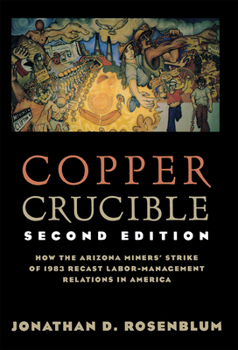Copper Crucible: How the Arizona Miners' Strike of 1983 Recast Labor-Management Relations in America
Select Format
Select Condition 
Book Overview
A Choice Magazine Outstanding Academic Book for 1995 Jonathan D. Rosenblum's history of this one strike reveals to us, in chapter and verse, the barbaric use of power by the corporate big boys. It is a stunning metaphor for labor's trouble today.--Studs Terkel (from a review of the first edition) Rosenblum writes with the verve of a good journalist and the empirical precision of a fine scholar. He is as deft at sketching brief portraits...
Format:Paperback
Language:English
ISBN:0801485541
ISBN13:9780801485541
Release Date:December 1998
Publisher:ILR Press
Length:288 Pages
Weight:0.85 lbs.
Dimensions:0.7" x 6.0" x 9.0"
Age Range:18 years and up
Grade Range:Postsecondary and higher
Related Subjects
Business Business & Finance Business & Investing Economics History Industrial Relations Industries & Professions Labor & Industrial Relations Management & Leadership Political Science Politics & Government Politics & Social Sciences Popular Economics Social Sciences State & Local TextbooksCustomer Reviews
2 ratings
Killing a Union -- Phelps Dodge v. the Miners
Published by Thriftbooks.com User , 21 years ago
This history of a bitter Arizona mining strike in 1983-86 is a top-notch case study of how unions were mugged by American corporations in the 1980s. To judge by the endnotes, Rosenblum interviewed every player in the strike -- from Phelps Dodge executives and union leaders to ex-Governor Babbitt and undercover cops -- and the result is a vivid narative that weaves together labor history and political and legal analysis. The sections on pro-management bias at the NLRB and the use of undercover police to spy on strikers are gems of investigative reporting. Rosenblum is pro-union but he presents management's case at length and doesn't hold back from sharp criticism of the United Steelworkers leadership. If you're interested in labor history or labor/management relations in the US, read this book.
The destruction of workers' lives despite union membership
Published by Thriftbooks.com User , 24 years ago
This book focuses on the destruction of individuals' lives when they cross paths with a powerful corporation, Phelps Dodge, when that company has the leverage to do so. This book reveals clearly how thin was the veneer of the labor-management accord after WWII. Phelps Dodge saw an opportunity to bust their unions and aided by labor law, labor law officials, and law enforcement departments did so. This book is strongest in its depiction of personalities but is weakest in putting this entire episode in a larger perspective. Rosemblum casts doubt on the unions understandings and strategies in this strike of 1983. But what is missing is any broad attempt to frame this labor conflict in context of the political understandings and power of the American working class in general. Why are the anti-labor biases of labor law officials, judges, and law enforcement officials tolerated in this country? Do most working poeple support these biases? Do they not know that they exist or consider them to be irrelevant? Do they support union-busting? If not, are they powerless to elect pro-worker Congressmen and change labor laws? Union actions and community understandings take place in these unanswered contexts. The book is highly readable but one is left primarily with sympathy for the mostly Chicano workers who had their lives uprooted and not with a broader understanding of labor relations other than the obvious capability of a company with an extreme anti-union animus to carry out its will.





